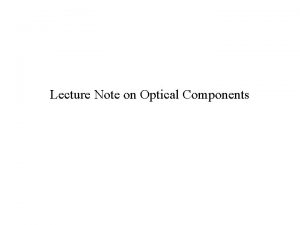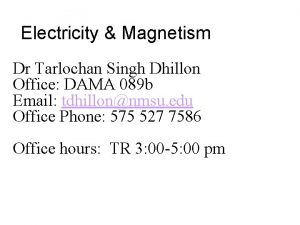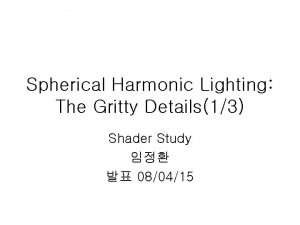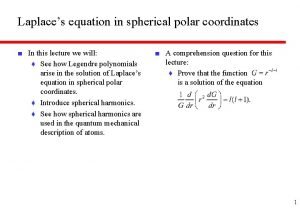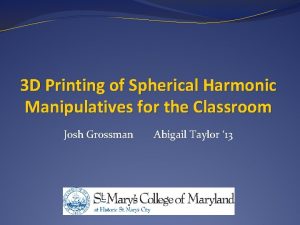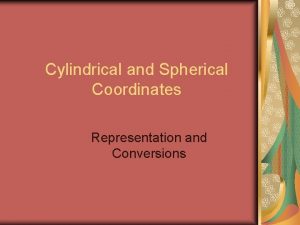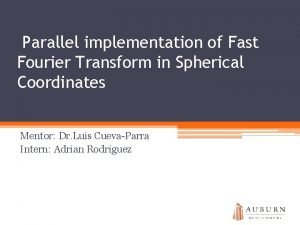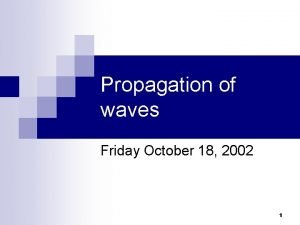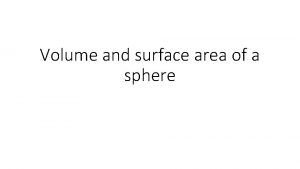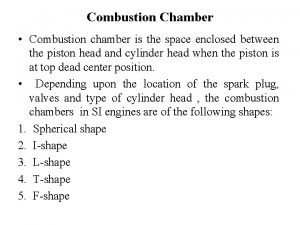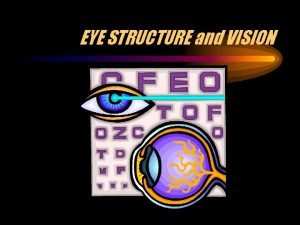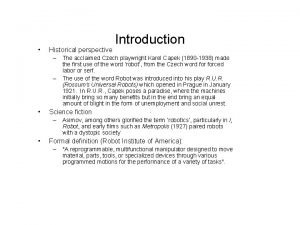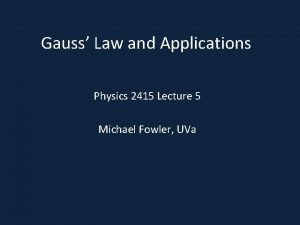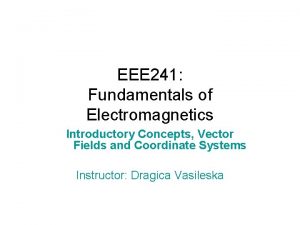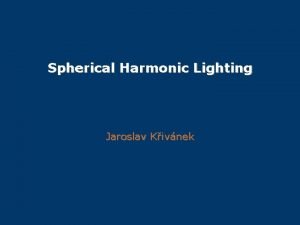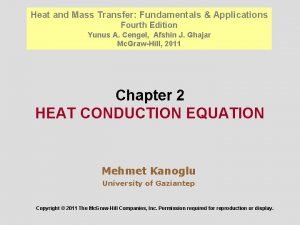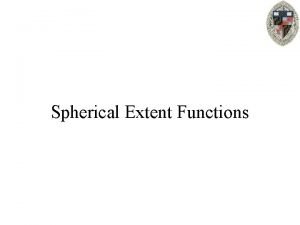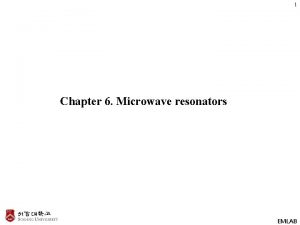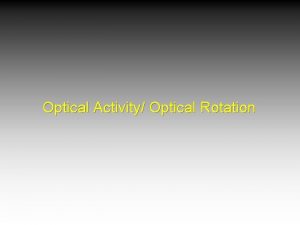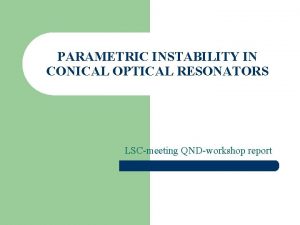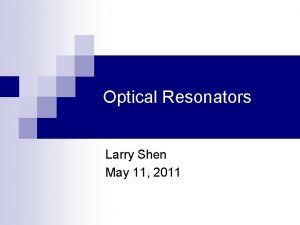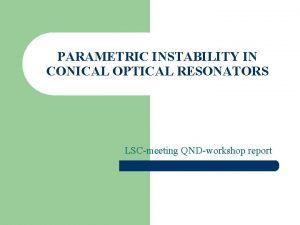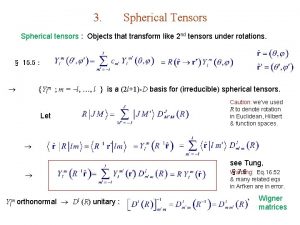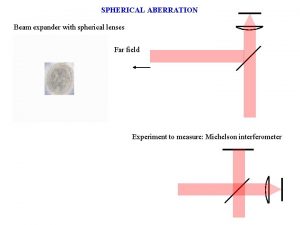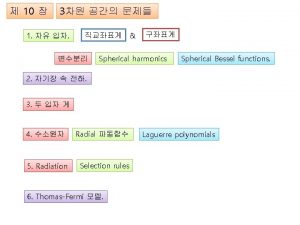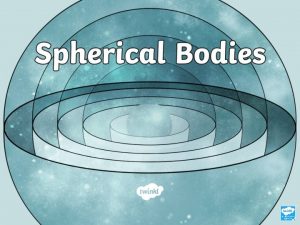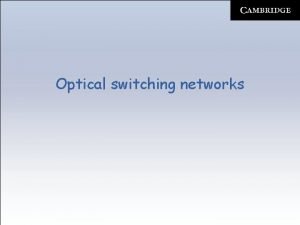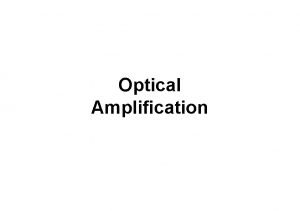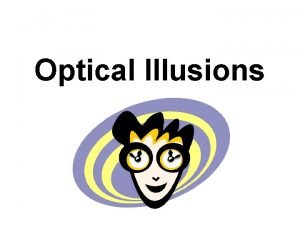Lecture 5 3 3 Optical Resonators with Spherical




















- Slides: 20

Lecture 5 § 3. 3 Optical Resonators with Spherical Mirrors We will show the field solutions inside the spherical mirror resonator are Gaussian Beams w 0 R 1 R 2 Z=0 z

§ 3. 3 Optical Resonators with Spherical Mirrors I. Optical Resonator Algebra R>0 R > 0 when convex mirror faces cavity R < 0 when concave mirror faces cavity R 1 R 2 Knowing: Find: w 0 z 1 z 2 Z=0 Knowing: Find: R<0

§ 3. 3 Optical Resonators with Spherical Mirrors For example: In practice we have R 1 and R 2, as well as cavity length L, find w 0 and mirror location? L w 0 z 1 z 2 R 1 and Z=0 R 2

§ 3. 3 Optical Resonators with Spherical Mirrors II. The Symmetrical Resonator The minimum spot size is locate at and For symmetrical confocal resonator

§ 3. 3 Optical Resonators with Spherical Mirrors Example: Design a Symmetrical Resonator Find the relation of mirror curvatures and minimum spot size

§ 3. 4 Mode Stability Criteria The previous sections show the stability depends on the l, R 1 and R 2. 1) A Symmetrical Resonator w / wconf 1 l/R 0 Plane-parallel Cavity 1 Loss high 2 Concentric Cavity

§ 3. 4 Mode Stability Criteria Stability condition for optical resonators

§ 3. 5 Modes in a Generalized Resonator – The Self-Consistent Method I. Self-Consistent Mode Self-consistency condition: reproduces itself after one round trip Compare to: General Stability Condition of an Arbitrary Resonator

§ 3. 5 Modes in a Generalized Resonator – The Self-Consistant Method The other plane can be obtained by applying the ABCD law to qs

§ 3. 5 Modes in a Generalized Resonator – The Self-Consistent Method II. Stability of the Resonator Modes We just find the existence condition and its solution of steady-state resonator modes. Now we need investigate whether the modes are stable. Perturbate the steady-state solution

§ 3. 5 Modes in a Generalized Resonator – The Self-Consistent Method At steady state:

§ 3. 6 Resonance Frequencies of Optical Resonators We now consider the resonance frequency (longitudinal mode) of a given spatial mode A transverse mode of electromagnetic radiation is a particular electromagnetic field pattern measured in a plane perpendicular (i. e. transverse) to the propagation direction of the wave. A longitudinal mode of a resonant cavity is a particular standing wave pattern formed by waves confined in the cavity.

§ 3. 6 Resonance Frequencies of Optical Resonators I. Varying q with a fixed l and m Longitudinal phase shift: q is some integer Intermode frequency spacing (or FSR)

§ 3. 6 Resonance Frequencies of Optical Resonators II. Varying l and m with a fixed q All modes with the same value of l+m for a given q are degenerate. For different l+m

§ 3. 6 Resonance Frequencies of Optical Resonators 1) For a confocal resonator n l+m = const. q = const. q+1 q q+2 q+3 l+m+1 l+m+3 l+m+5 l+m+7

§ 3. 6 Resonance Frequencies of Optical Resonators 2) For a nearly planar resonator 1 2 3 n q Bad for spectral analyzer q+1

§ 3. 6 Resonance Frequencies of Optical Resonators 3) For the general case +: When both and are positive -: When both and are negative

§ 3. 7 Losses in Optical Resonators An understanding of the mechanisms by which electromagnetic energy is dissipated in optical resonators and the ability to control them are of major importance in understanding and operating a variety of optical devices. Loss per pass Photon lifetime 1) Photon lifetime 2) Loss per pass with cavity length l Quality factor

§ 3. 7 Losses in Optical Resonators For a resonator with mirrors’ reflectivity R 1 and R 2 and average distributed loss constant a 3) Quality factor

§ 3. 7 Losses in Optical Resonators The most common loss mechanisms in optical resonators are: 1. Loss resulting from nonperfect reflection. 2. Absorption and scattering in the laser medium. 3. Diffraction losses.
 Optical amplifiers lecture notes
Optical amplifiers lecture notes 01:640:244 lecture notes - lecture 15: plat, idah, farad
01:640:244 lecture notes - lecture 15: plat, idah, farad Tarlochan singh dhillon
Tarlochan singh dhillon Precomputed radiance transfer
Precomputed radiance transfer Laplace equation in spherical polar coordinates
Laplace equation in spherical polar coordinates Spherical complexes of emulsified fats are known as
Spherical complexes of emulsified fats are known as Spherical harmonics formula
Spherical harmonics formula Cylindrical spherical coordinates
Cylindrical spherical coordinates Fourier transform spherical coordinates
Fourier transform spherical coordinates Spherical waves equation
Spherical waves equation Find the volume of the composite figure
Find the volume of the composite figure Mirror formula
Mirror formula Space frame dome
Space frame dome Pre chamber combustion
Pre chamber combustion Atomy korean red ginseng spherical granule
Atomy korean red ginseng spherical granule What helps maintain the eyeball's spherical shape
What helps maintain the eyeball's spherical shape Seiko rt3300
Seiko rt3300 Spherical symmetry
Spherical symmetry Properties of unit vector
Properties of unit vector Spherical harmonic lighting
Spherical harmonic lighting We transferü
We transferü
